Since protests began on March 30, Israeli forces have killed at least 150 Palestinians in the besieged coastal enclave.
For nearly four months, Palestinians in the Gaza Strip have been protesting along the fence with Israel, demanding their right to return to the homes and land their families were expelled from 70 years ago.
The Great March of Return rallies culminated on May 15 to mark what Palestinians refer to as the Nakba, or Catastrophe - a reference to the forced removal of 750,000 Palestinians from their homes and villages to clear the way for Israel's establishment in 1948.
The mass Friday demonstrations have since continued.
Since the protests began on March 30, Israeli forces have killed at least 151 Palestinians in the besieged coastal enclave and wounded more than 16,000 people, according to health officials in Gaza.
Latest updates as of Friday, July 27
Friday, July 27
Israeli forces kill Palestinian, 14
A 14-year-old Palestinian has been killed by Israeli army fire, according to health officials in the besieged Gaza Strip.
Ashraf al-Qidra, spokesperson for the health ministry in Gaza, said the teenager was killed east of Khan Younis.
His killing raises the number of Palestinians shot dead on Friday to two - earlier in the day, Ghazi Mohammad Abu Mustafa, 43, succumbed to his wounds after being shot in the head.
Al Jazeera's Stefanie Dekker, reporting from the protest site in Gaza, said the Israeli military was also using drones to drop tear gas on demonstrators.
"Israel has been using these drones to drop tear gas further back into the crowd. Closer to the fence, Israeli snipers keep watch and sporadically open fire."
At least 184 Palestinians were wounded by Israeli forces on Friday, 117 of whom needed hospital treatment, said al-Qidra. Seventy cases involved live bullets. Among the wounded were 14 children and 10 women, as well as four paramedics and one journalist.
A total of 151 Palestinians have been killed since the Great March of Return protests started on March 30.
Gaza situation 'very tense' amid standoff
Al Jazeera's Charles Stratford, reporting from the protests in the Gaza Strip, said that apart of the killing of Ghazi Mohammad Abu Mustafa by Israeli forces, 11 other Palestinians were believed to have been wounded.
Stratford said that Israeli soldiers also used "a lot of tear gas" against protesters, with much of it fired from drones.
"The situation is very tense," added our correspondent, adding there were growing fears of a further escalation following the recent wave of attacks that hit the besieged enclave.
"What we're seeing here is a standoff between Hamas and the various armed factions in Gaza and the Israelis. Hamas says that these people have every right to continue demonstrating and describe this form of protest using incendiary balloons and kites as being peaceful and they say they have every right to defend the people of Gaza using their weapons."
Israeli forces kill Palestinian
Israeli soldiers have shot dead Ghazi Mohammad Abu Mustafa, a 43-year-old Palestinian, near Khan Younis in the Gaza Strip, according to the Palestinian Ministry of Health.
Three ambulance volunteers also were injured in the shooting near the fence with Israel.
According to Palestinian news agency Wafa, Mustafa was shot in the head and subsequently taken to a hospital, where he died of his wounds.
The total number of Palestinians killed so far in the ongoing protests since late March is now 150. More than 16,000 others have been wounded.
Half of those suffering wounds were hit by live gunfire, and at least 60 of them have had a limb amputated.
Wednesday, July 25
An Israeli air raid in the Gaza Strip killed three Palestinians on Wednesday.
The attack came days after a United Nations-brokered ceasefire helped halt an earlier wave of assaults against the Gaza Strip last week.Ahmed al-Bsous, 28, Ubadah Farawneh, 29 and Mohamed al-Aareer, 27, died of their wounds shortly upon arriving at the al-Shifa hospital in Gaza.
Saturday, July 21
Ceasefire appears to hold
The "return to calm" announced by Hamas in Gaza appears to be holding.
Israeli officials have yet to comment on the ceasefire announced by Hamas earlier in the morning.
Hamas and Israel agree on Gaza ceasefire: group spokesman
Hamas and Israel agreed to a ceasefire early on Saturday, according to a spokesman for the Palestinian group governing the besieged Gaza Strip.
"With international and UN efforts, we reached (an agreement) to return to the previous state of calm between the (Israeli) occupation and the Palestinian factions," Hamas spokesman Fawzi Barhoum said in a statement.
"With international and UN efforts, we reached (an agreement) to return to the previous state of calm between the (Israeli) occupation and the Palestinian factions," Hamas spokesman Fawzi Barhoum said in a statement.
Israeli forces kill fourth Palestinian; Israeli soldier shot dead
Israeli forces have shot dead a Palestinian during the protests in the Gaza Strip near the fence with Israel, raising the number of Palestinians killed on Friday to four.
Israeli soldiers fired live bullets and teargas canisters towards the protesters along the fence, killing Mohammad Sharif Badwan and wounding 120 others, according to health officials in Gaza.
The killing of Badwan, 27, came after Hamas said three of its members were killed earlier in the day in air strikes in the southern part of the Strip.
Later on Friday, the Israeli military said gunfire at the Gaza fence killed an Israeli soldier.
The military said a "terrorist squad" fired at troops and one soldier was severely injured and later died of his wounds. He was the first Israeli military fatality in months of violence along the Gaza fence.
The violence raised fears of a new conflict.
"We understand that the Israeli security cabinet has been meeting this afternoon in order to assess whether a large-scale military operation is needed on Gaza," said Al Jazeera's Charles Stratford, reporting from the besieged enclave.
"The people of Gaza this evening are very afraid after today's protests and certainly these air strikes that have happened," he added.
Israel launches large-scale air attacks in Gaza
The Israeli air force has launched a series of air strikes on several places in the Gaza Strip.
The targets, allegedly belonging to Hamas, were attacked as a result of Friday's shooting incidents in which at least one Israeli soldier was wounded.
Israeli soldiers have been put on high alert, the spokesperson for the Israeli army added.
Tense day of protests
Al Jazeera's Stefanie Dekker, reporting from the protests in Gaza, said tensions were on the rise despite the relatively small crowd that showed up.
"We haven't seen huge numbers of people turn out - yes, there's been a presence, yes the protest took shape the way we have seen over the past 17 weeks but the crowds were smaller," Dekker said.
"What makes it more tense is there has been an exchange … of fire between Israel and Hamas, and Israel attacked various Hamas posts," she added.
"This all comes amid a very tense political situation. Israel has made it very clear that if Hamas doesn't stop the incendiary balloons and kites across the fence that it will clamp down heavily militarily.
"We haven't seen any incendiary balloons or kites across the fence where we are, but certainly there is a feeling of unease here - there might be behind-the-scenes negotiations going on, but everyone you speak to will tell you that the situation remains very hard to read, whether there is going to be an escalation between the two sides or not," Dekker said.
Three Palestinians killed on tense day of protests
As protests along the fence with Israel entered the 17th straight week, Israel on Friday attacked Hamas positions in the Strip, killing at least three people, according to health officials in Gaza.
"Three Palestinians were martyred by Israeli occupation forces, including two in the northern Gaza Strip and a third in the southern city of Rafah,” ministry spokesman Ashraf al-Qidra said in a statement.
He did not provide the names or ages of the individuals.
However, the Ezzedine al-Qassam Brigades, the armed wing of Hamas, which has governed the Gaza Strip since 2007, said three of its members had been killed by Israeli air raids and tank fire in Khan Younis and Rafah.
In a statement, the group identified the men as Shaaban Abu Khater, Mohamed Abu Farhana and Mahmoud Qeshta.
The Israeli army said the attacks were in response to shots being fired at their troops along the Gaza fence.
Al Jazeera's Stefanie Dekker, reporting from the protests in Gaza, said tensions were on the rise.
"We've had a couple of incidents today. We've had Israel target three Hamas watchtowers. In the south of Gaza, two Palestinians were killed and one Israeli soldier was injured in what we understand was an exchange of fire in the southern Gaza Strip," Dekker said.
"The shooting across the border, the gunfire, the tank shelling - it shows that this is politically not resolved and it could still go any way really."
Earlier on Friday, Israel's Defence Minister Avigdor Liebermann said that there is a risk of military escalation if incendiary kites and balloons continue to be sent over the fence by protesters.
Those devices have led to the burning of thousands of acres of Israeli land.
"We tried to be sensible and responsible but the heads of Hamas are leading us to a defensive situation, a situation where we would have to go for a wide painful military operation," Liebermann said.
Thursday, July 19
Israeli air attack kills one Palestinian
An air raid by the Israeli air force killed one Palestinian and wounded three others, in an attack east of Rafah in the southern Gaza Strip, the health ministry said.
A family member said on Thursday than the man killed was working as a border policeman in the Hamas-run enclave. Al Jazeera's Charles Stratford said the 22 year-old was a member of the Qassam Brigades, the armed wing of Hamas.
Israel said one of its aircraft targeted a group launching balloons carrying firebombs over the border fence to burn Israeli farmland.
Israel's fire service says hundreds of fires have burned about 3,000 hectares, causing damage amounting to hundreds of thousands of dollars.
Wednesday, July 18
No more gas and fuel deliveries, fishing zone restricted even more
On Wednesday, Israel tightened its blockade on the Gaza Strip, preventing gas and fuel deliveries through its only commercial crossing with the Palestinian besieged enclave a week after Israeli authorities announced the closure of the crossing.
The Kerem Shalom crossing, known to Palestinians as Karem Abu Salem, was shut down on July 9.
Initially, only items deemed as "humanitarian" were to be allowed to enter Gaza, such as food, hygiene and medical supplies, fuel, animal feed and livestock.
However, the defence ministry announced late on Monday that fuel and gas deliveries would also be suspended, and that the crossing would remain open only for food and medicine on a case-by-case basis.
Furthermore, the fishing zone, enforced by Israel, in the waters off the Gaza Strip would also be reduced from six nautical miles to three - after it was already reduced last week from 12 nautical miles.
The UN and Gisha, the Legal Centre for Freedom of Movement, called Israel's latest measure an act of "collective punishment".
Saturday, July 14
Air raids by Israeli air force kill two teenage Palestinians
Two teenagers in the Gaza Strip were killed by Israeli air raids on Saturday, according to Palestinian health officials, as Israel carried out the largest daylight attack on the besieged enclave since the 2014 war.
Amir al-Nimra, 15, and Luay Kaheel, 16, died of their wounds on Saturday shortly after an air strike targeted al-Kateeba, an area in western Gaza, the health ministry said.
Twelve others were wounded by the attack.
The al-Kateeba square is adjacent to a park frequently visited by families over the weekend, especially during the summer months
Monday, July 9
Hamas condemns Israel's plan to close border crossing
Hamas has condemned an Israeli decision to seal off the Karam Abu Salem commercial border crossing, the primary passageway that transfers necessities to residents of the besieged Gaza Strip.
The group, which governs the enclave, described Monday's measure as a "crime against the people of Gaza", blaming the international community's prolonged silence that encourages Israel's blockade on Gaza.
Earlier on Monday, Israel said it will be closing off the Karam Abu Salem border crossing, saying it was in retaliation over Palestinians setting fire to Israeli land.
Israeli Prime Minister Benjamin Netanyahu said the decision to shut down the border was taken in coordination with the country's defence minister.
The move, which will come into effect on Tuesday, will only allow for the transfer of humanitarian needs such as cooking gas as well as wheat and flour into Gaza, an official responsible for coordinating the movement of cargo through the border confirmed to Al Jazeera from Gaza.
Saturday, July 7
Two Palestinians killed
Health officials in Gaza said two Palestinians have been killed by Israeli fire during demonstrations. Hundreds of other protesters were also wounded.
The victims included 11-year-old Yasser Abu al-Naja who died after sustaining a gunshot wound to the head east of Khan Younis, Ashraf al-Qidra, spokesperson for Gaza's health ministry, said.
Mohammad Fawzi Hamaydeh, 24, was also pronounced dead shortly after being shot by Israeli live fire in the abdomen and foot, east of Rafah in the southern Gaza Strip.
Among the 415 wounded at Friday's demonstration, 11 were children. Three of the injured cases were severe.
Friday, June 29
One Palestinian killed, nearly 400 injured
Hundreds of mourners marched in Gaza on Saturday at the funeral of a Palestinian man killed by Israeli forces on the 15th consecutive Friday of the Great March of Return.
Ashraf al-Qidra, spokesperson for Gaza's health ministry, said that 22-year-old Mohammad Jamal Abu Halima was killed after being shot in the chest.
He added that 396 others were wounded.
Among them, 13 were children. Fifty-seven were injured from live ammunition.
Friday, June 14
Palestinian man succumbs to wounds
Ahmed Ziad al-Assi, 21, died on Thursday morning east of the Gaza Strip as a result of wounds inflicted by Israeli forces on June 8, according to Palestinian health officials.
Israeli forces shot al-Assi in the head during the 11th Friday of the Great March of Return protests.
His death takes the number of Palestinians killed by Israeli forces since the protests began to at least 129.
Friday, June 8
UN to hold emergency meeting
The UN General Assembly will hold an emergency meeting on Wednesday to vote on an Arab-backed resolution on Gaza, the body's president Miroslav Lajcak has announced.
The resolution will condemn Israel, and will be similar to one vetoed by the United States in the Security Council last week, which called for protecting Palestinians from Israeli aggression, according to diplomats.
There are no vetoes in the 193-member world body, but while Security Council resolutions are legally binding, General Assembly resolutions are not.
Four Palestinians killed by Israeli forces
Health officials in the Gaza Strip say the number of Palestinians killed by Israeli forces during protests near the fence with Israel has risen to four.
Yousef al-Fasih, 29, was shot dead while demonstrating in the eastern Gaza Strip, Palestinian news agency Wafa said.
More than 600 people were wounded by Israeli forces, including photographer Mohammed Abed al-Baba, who was shot in the leg.
Al-Baba, who has worked for AFP news agency in the Gaza Strip since 2000, was shot while clearly identified in a press vest and helmet, around 200 metres from the fence east of Jabalia in northern Gaza.
Teargas drones
Al Jazeera's Imran Khan, reporting from the protests in the Gaza Strip, says Israeli forces are firing teargas at protesters.
"They are using this in two ways, firstly coming in from jeeps ... to try and disperse the [crowd], [and] they are also using teargas drones," he said.
"However, the Palestinians have figured out a way of dealing with these drones ... they've figured out that they can entangle a drone into kites, and they have managed to bring down an Israeli drone," he added.
Three Palestinians killed by Israeli forces
Health officials in the Gaza Strip say Israeli forces have killed at least three Palestinians and injured more than 500 during protests near the fence with Israel.
Israeli troops shot and killed 15-year-old Haitham al-Jamal east of Khan Younis, in southern Gaza Strip, Palestinian news agency Wafa said, citing the health ministry.
Ziad Jadallah Bureim was also shot dead while participating in protests in the southern Gaza Strip, while Imad Nabil Abu Darabi, 26, was killed east of Jabalia town in northern Gaza Strip, Wafa added.
Of those injured, 92 protesters sustained live fire wounds, including seven who are critically wounded. Twenty-six children and 14 women are among the wounded.
The remaining injuries were caused by teargas inhalation.
Hundreds injured in Gaza
Gaza's health ministry says at least 386 Palestinian protesters near the fence with Israel have been wounded by Israeli forces.
The ministry says five of the wounded were in serious condition.
In pictures: burning kites, teargas near border
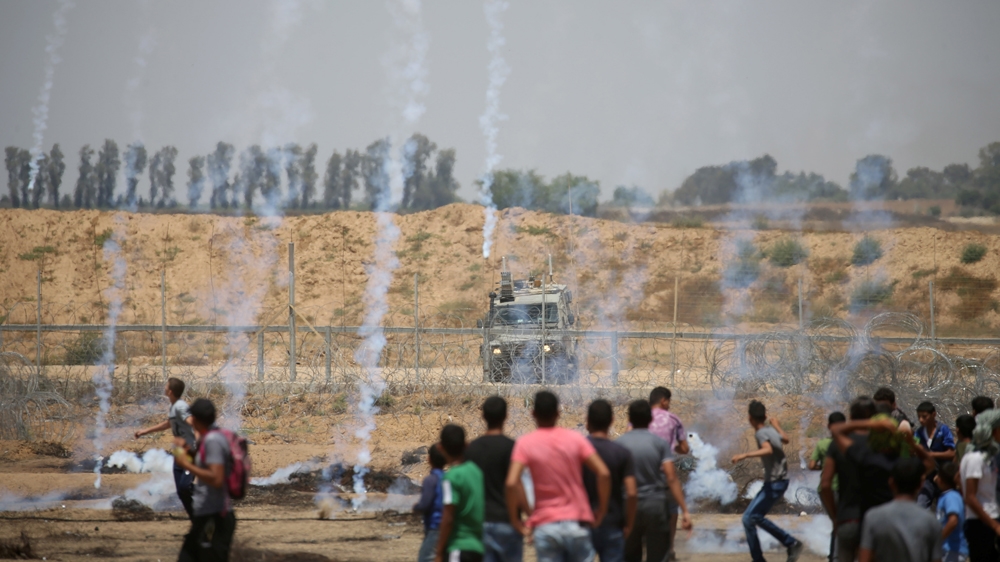 |
| Teargas fired by Israeli troops at Palestinian demonstrators during a protest marking Jerusalem Day [Ibraheem Abu Mustafa/Reuters] |
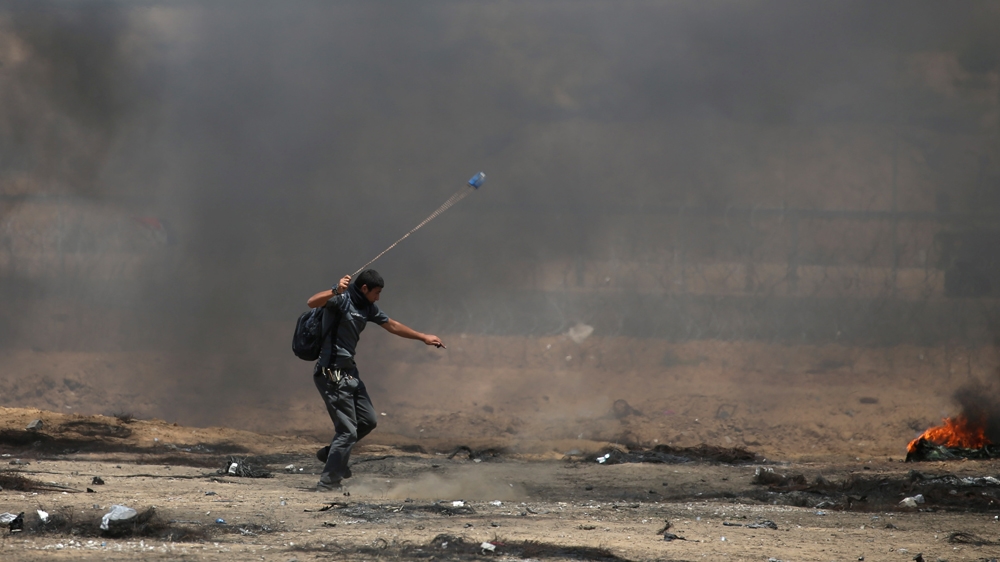 |
| A Palestinian demonstrator uses a sling to hurl stones at Israeli troops at the Israel-Gaza border [Ibraheem Abu Mustafa/Reuters] |
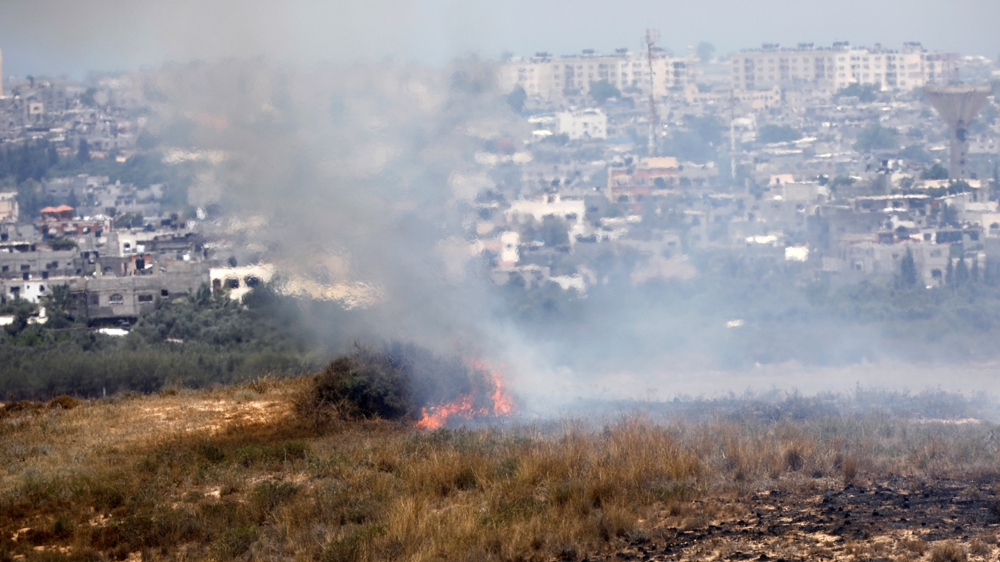 |
| A fire burns in scrubland in Israel near the Gaza Strip; Palestinians have been flying kites and balloons loaded with flammable material across the border between Israel and Gaza [Amir Cohen/Reuters] |
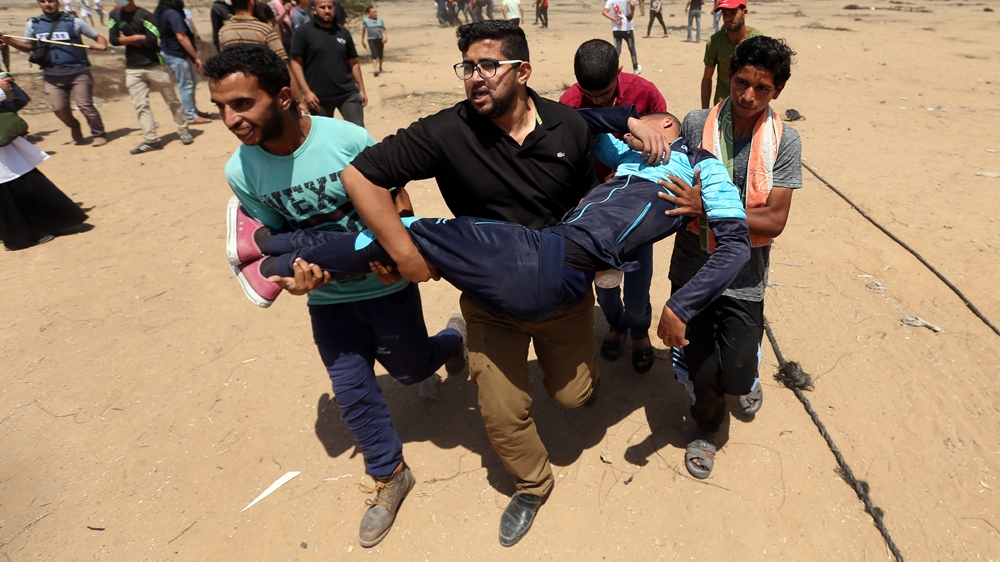 |
| A wounded Palestinian demonstrator being evacuated [Ibraheem Abu Mustafa/Reuters] |
Crowds gathering near border
People are gathering near the border with Israel, defying warnings from the Israeli army.
Reporting from the border, Al Jazeera's Imran Khan said: "today is Jerusalem day, created by Iranians after the Islamic Revolution in 1979 and that's why people are arriving earlier than they normally would on a Friday to protest at the border".
Protest organisers have urged people to stay away from the buffer zone to avoid casualties, Khan said.
"If you're a member of Islamic Jihad or Hamas, you're probably likely to listen to the protest organisers and not go towards the buffer zone.
"However if you're just one of these little kids who are flying kites, throwing rocks, you don't have to listen to anybody.
"That's a real fear for many people here, that they won't listen to those instructions not to go near the border, and that's why there may well be casualties," Khan said.
Israel warns people in Gaza to avoid border
The Israeli army has warned people in Gaza not to come close to the border with Israelduring Friday's protests, a day when a big turnout is expected.
In a series of tweets issued on Thursday, the Israeli army said they had dropped leaflets in Gaza warning people from approaching the security fence.
Israeli newspaper Haaretz said the leaflets urged people in Gaza "not to let Hamas turn you into a tool to serve its narrow interests".
"We urge you not to take part in demonstrations and anarch and not to put yourself in danger," the leaflets reportedly said.
June 3
Palestinian man succumbs to wounds
Mohammed Naaim Hamada, 30, died on Sunday morning east of the Gaza Strip as a result of wounds inflicted by Israeli forces on May 14, according to Palestinian health officials.
Israeli forces shot Hamada during the Great March of Return protests that coincided with the opening of the US embassy in Jerusalem, and a day before Palestinians marked 70 years since the Nakba, or Catastrophe.
Hamada's death takes the number of Palestinians killed by Israeli forces since the protests began to at least 121.
Friday, June 1
Palestinian paramedic killed
Razan al-Najjar was killed by Israeli live fire during the protests east of Khan Younis, a city in southern Gaza, according to Palestinian health officials.
The 21-year-old volunteer paramedic died of a gunshot wound to the chest, the Palestinian health ministry said.
A witness said she was shot while running towards the fortified fence to help a casualty.
Wearing a white uniform, "she raised her hands high in a clear way, but Israeli soldiers fired, and she was hit in the chest", the witness told Reuters news agency.
Palestinian medical sources say more than 100 other protesters were wounded, 40 of them with live fire.
Read more about the struggle of medical workers to provide healthcare amid shootingsby Israeli forces here.
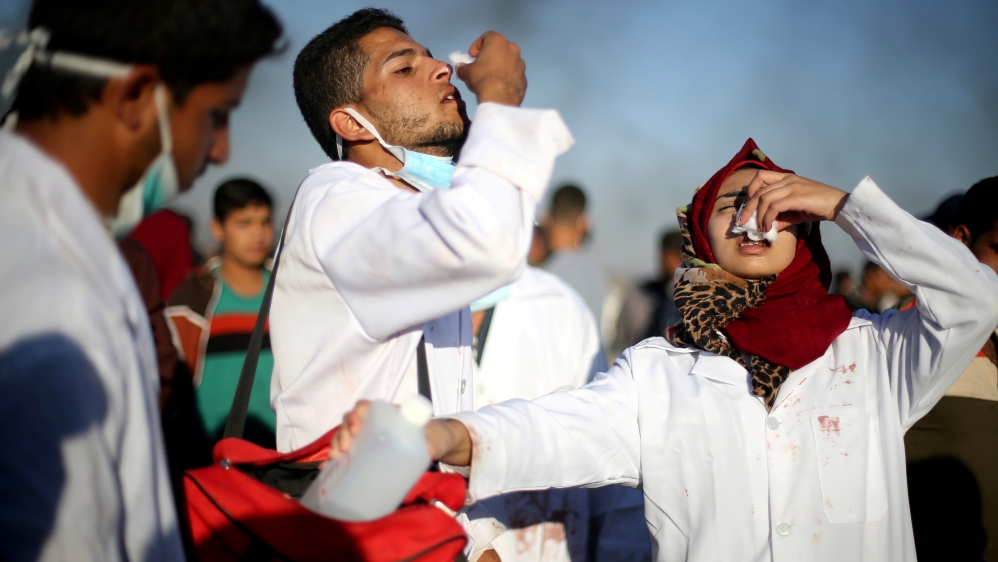 |
| Razan al-Najjar (R) reacting to tear gas during an April 1 rally in the southern Gaza Strip [File: Ibraheem Abu Mustafa/Reuters] |
Protesters met with live fire, tear gas
Al Jazeera's Harry Fawcett, reporting from the rally in Gaza, said the demonstrations "showed no signs of ending".
"These protesters have once again been met with live fire from Israeli forces and repeated, very heavy use of tear gas as well," he said.
"But how long this is sustainable? It is still seen by many Palestinians here in Gaza as a way of venting their continued desperation with the worsening humanitarian situation.
"The real question though is when the political decision from Hamas will come to end these protests, if it does," added Fawcett.
"A senior adviser to the Hamas leadership told Al Jazeera that it is a question of Israel lifting the siege and the blockade. At that point, this strategy of peaceful protests could perhaps change."



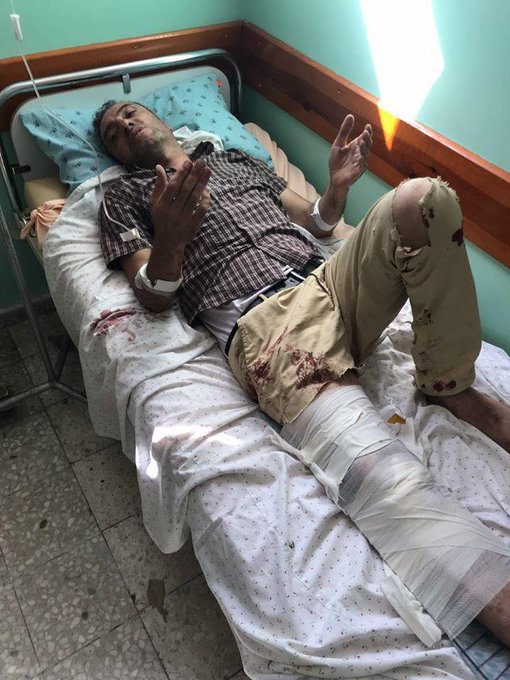


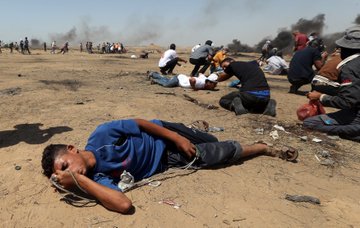
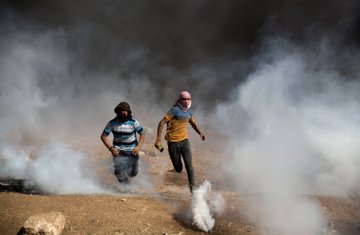



No comments:
Post a Comment
Note: only a member of this blog may post a comment.